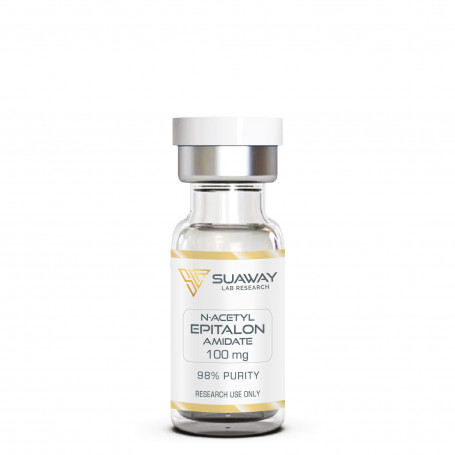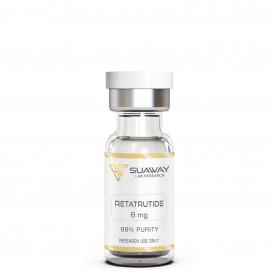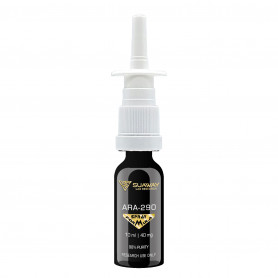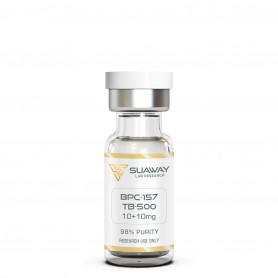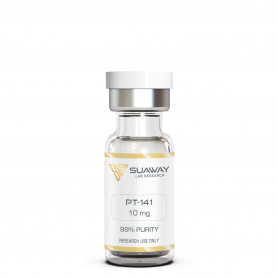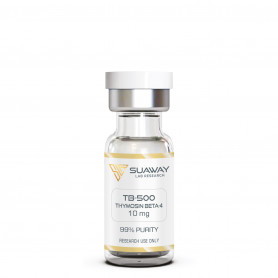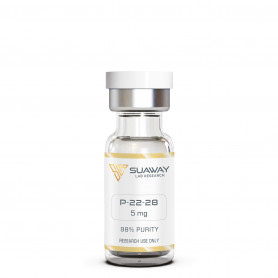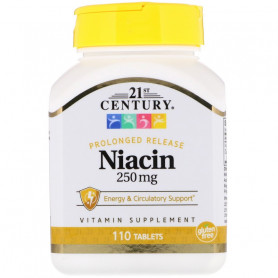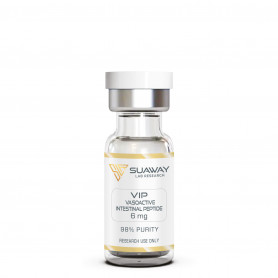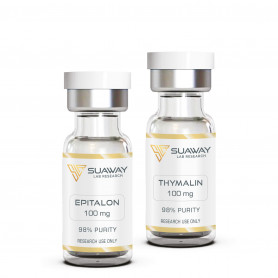N-ACETYL EPITALON AMIDATE - 100 mg
The synthetic peptide Epitalon has been changed to become N-Acetyl Epitalon Amidate. It is a synthetic epithalamin derivative and a possible telomerase modulator. According to research, Epitalon promotes telomere lengthening, which may help the body combat the consequences of aging. According to studies, N-Acetyl Epitalon Amidate controls the following activity:
- Activates telomerase
- Elongates telomeres
- Promotes the survival of cells, resistance to stress and oxidative changes
- Balances the secretion of endocrine, improves pineal gland function and increases the release of melatonin
- Attenuates excess secretions of cortisol from higher levels
- Increases antioxidant enzymes
- Increases brain health, stops brain cell aging and remodelling
- Restores quality of life and extends lifespan by performing the above-mentioned functions
Warning: The acetylation and amidation make the peptide less polar, and consequently less water soluble.
Beschreibung
STRUCTURE
Sequence: Ac-Ala-Glu-Asp-Gly-NH2
Molecular Formula: C16H25N5O9
Molecular Weight: 431.39 g/mol
CAS Number: 137525-51-0
Peptide purity: Greater than 98%
Other details: No TFA Salt
Storage: Lyophilized peptide must be stored at -20°C and peptide solution at 4°C.
N-Acetyl Epitalon Amidate has low oral and excellent subcutaneous bioavailability.
N-Acetyl Epitalon Amidate is more effective than other standard Epitalon formulations, according to extensive studies.
DESCRIPTION
The synthetic peptide Epitalon has been changed to become N-Acetyl Epitalon Amidate. It has substantial impacts on cancer, infectious illness, DNA (particularly telomere) control, and skin health, and is widely recognized in research settings for its anti-aging abilities.
The peptide's main function is unaffected by the alterations, but Epitalon's half-life, stability, and effectiveness are all affected. The native peptide is only subjected to N-acetylation and amidation. Each offers unique advantages that increase Epitalon's potency and enable lower peptide dosages.
N-Acetyl epitalon amidate has been shown to affect protein synthesis and neurogenetic differentiation gene expression in studies in cell culture. According to molecular modeling, this happens as a result of epigenetic regulation of a few genes that code for the proteins Nestin, GAP43, tubulin III, and doublecortin. N-Acetyl Epitalon Amidate binds to certain histone proteins, facilitating easier access to the genes, and increasing the expression of these peptides by up to 1.8 times. Greater gene expression and hence increased protein synthesis occur as a consequence of improved access to the DNA in certain locations.
N-Acetyl Epitalon Amidate has been associated with greater learning, accelerated recovery from CNS damage, and perhaps reduced long-term consequences of aging on the brain via enhancing access to the DNA sections holding the genes that regulate the aforementioned proteins. One of the various ways N-Acetyl Epitalon Amidate has been shown to have a favorable impact on the aging process is this latter characteristic. By encouraging the development and growth of neurons from stem cell progenitors, N-Acetyl Epitalon Amidate has specifically been proven to alter neuronal stem cell differentiation.
N-Acetyl Epitalon Amidate, even at extremely low concentrations, stimulates stem cell proliferation in rats of all ages, according to research on skin stem cell cultures. Particularly, up to 45% more fibroblasts are proliferating. Additionally, studies demonstrate that N-Acetyl Epitalon Amidate increases fibroblast functional activity while reducing apoptotic rates. The intracellular matrix "normalizes" as a result. In other words, N-Acetyl Epitalon Amidate helps to restore skin homeostasis and tip the scales in favor of younger-looking synthesis of proteins like collagen and elastin in aged skin. The end consequence is healthier skin overall.
The immune system is another area where N-Acetyl Epitalon Amidate actively participates in gene regulation. The expression of immunological signaling molecules such as CD5, IL-2, Arylalkylamine-N-acetyltransferase, interferon-gamma, and Tram1 is altered by N-acetyl epitalon amidate, according to a cell culture study. Each of these proteins has the following effects on the immune system.
• CD5 - CD5 affects immune system cell development, assisting stem cells in becoming functional cells that fight inflammation and infection.
• IL-2 - IL-2 is a strong regulator of the generation of white blood cells.
• Arylalkylamine-N-acetyltransferase - This enzyme is essential for the generation of melatonin, which is necessary for sleep but also for immune system modulation.
The activation of macrophages, natural killer cells, and T cells by interferon-gamma is shown to be crucial in the defense against infection in rats. It particularly plays a crucial position in the body's reaction to viral infection.
One of the main indicators and causes of aging is immune system decline. Chronic inflammation is brought on by dysregulated immune activity, which also contributes to the emergence of dementia and cardiovascular disease. One method by which N-Acetyl Epitalon Amidate combats the consequences of aging is by controlling the immune system.
N-Acetyl Epitalon Amidate has been demonstrated via research to inhibit the development of a variety of cancers in rat models. The peptide is now being researched as a possible adjuvant for the treatment of testicular cancer, leukaemia, and breast tumors that are Her-2/neu positive (hormone positive). It is interesting to note that N-Acetyl Epitalon Amidate seems to primarily affect cancer by controlling the PER1 gene. The hypothalamic hormone PER1, which controls circadian rhythm, is underexpressed in cancer patients.
The creation of the protein PER1, which is vital for circadian rhythm, is controlled by N-acetyl epitalon amidate. N-Acetyl epitalon amidate, a powerful regulator of sleep, has also been shown by studies in rats to control melatonin synthesis and release.
N-Acetyl Epitalon Amidate enhances melatonin synthesis and can restore regular sleep-wake cycles by acting at the arylalkylamine-N-acetyltransferase and pCREM genes. Age-related variations in melatonin and sleep patterns often lead to dysregulation, a condition that is almost certainly the consequence of altered DNA expression patterns. N-Acetyl Epitalon Amidate helps to counteract age-related alterations in sleep by returning DNA expression to a more youthful state. This in turn has a significant influence on a wide range of functions, including cognitive function, wound healing, immunological response, release of the growth hormone, weight gain, bone structure, and cardiovascular health.
In aging animals, N-Acetyl Epitalon Amidate aids in the restoration of DNA expression patterns. Many of the age-related changes that affect health and lifespan are brought on by a fall in the pineal gland's production of this peptide. In rats and insects, N-Acetyl Epitalon Amidate supplementation has shown that it may increase life span by up to 27% while reducing mortality by more than half.
At least a portion of the significant anti-aging benefits of N-acetyl epitalon amidate may be attributed to the aforementioned alterations in DNA expression patterns, which may have occurred as a consequence of epigenetic modifications brought on by histone protein binding. According to research, N-Acetyl Epitalon Amidate also affects telomere health and antioxidant activity.
Rat models, It has been shown that N-Acetyl Epitalon Amidate injections inhibit protein oxidative modification and LPO formation[. Lipid peroxidation, a regular biological process that is known to produce free radicals, leads to the generation of LPO (lipid peroxidation products). LPO is required for some typical biological processes, including the eradication of invasive pathogens and the recycling of broken proteins. The equal creation of antioxidants balances off the generation of potentially harmful free radicals. However, as we age, our ability to produce antioxidants declines, which increases the amount of protein and cellular damage caused by free radicals. N-Acetyl Epitalon Amidate helps to maintain the homeostatic balance that guards against harm from free radicals by offsetting the drop in antioxidant production.
N-Acetyl Epitalon Amidate has been shown to activate the telomerase enzyme in human somatic cells. Telomerase is crucial for maintaining the telomeres, the DNA's protective end caps. Telomeres are sections of DNA that do not contain genes but rather serve to shield DNA during replication. Telomeres aid in preventing the gradual degradation of functional DNA caused by replication. Unfortunately, when telomeres age, they naturally shorten, which causes cells to cease working and finally die. Telomerase aids in telomere repair, extending the life of cells in the process. N-Acetyl Epitalon Amidate has a direct influence on the health of DNA and therefore how long cells survive by enhancing the activity of telomerase.
There are various types of aging in general, however, they are all connected. In general, protein dysfunction is caused by DNA damage. Cellular dysfunction is caused by this in addition to direct protein damage. Senescence is the process through which cells either die or lose their ability to function as cellular dysfunction increases. Both processes ultimately result in tissue and organ failure, which in turn causes symptoms of aging including altered sleep patterns, weight gain, wrinkles, greying of the hair, and a rise in the prevalence of chronic illnesses. When enough of this "macro-damage" has occurred, the body is no longer able to support normal biological activity, which ultimately results in death. By fundamentally controlling DNA and protein damage, N-Acetyl Epitalon Amidate helps to counteract most of this dysfunction.
In synthetic chemistry, N-acetylation is used to alter the charge, hydrophobicity, and size of a protein. This can impact how long the protein lasts, where it localizes to in the body, and what receptors it binds to. In most cases, N-acetylation is done to prolong the half-life of a protein without affecting its overall function. It is a relatively simple process, making it an affordable and well-known mechanism for improving the potency of a peptide.
Amidation is another minor peptide modification, this time to the carboxyl group on the other end of the amino acid chain. Like N-acetylation, amidation is a natural process that occurs in up to half of all known peptides. Amidation makes peptides less sensitive to proteolytic degradation and extends their half-life in the blood stream. Amidated peptides are less sensitive to changes in pH and more easily bind to their receptors. They also bind more tightly to their target receptors, a feature that extends the effects of amidated proteins as compared to their non-amidated counterparts.
In synthetic biology, amidation serves to several functions. First, amidation helps to protect orally administered peptides from the harsh environment in the stomach and GI tract. The second reason that most synthetic peptides are amidated is to improve their potency after absorption. Amidated proteins not only survive longer in the bloodstream, they bind more tightly to their target receptors and produce enhanced signaling as a result. This latter fact is particularly important for peptides that are active in the central nervous system, like Epitalon. Finally, amidation increases lipid solubility and thus increases the amount of Epitalon crossing the BBB. So, not only is N-Acetyl Epitalon Amidate more potent due to enhanced receptor binding, but more of it also reaches the receptors in the central nervous system.
REFERENCES
V. Khavinson et al., "Pineal-regulating tetrapeptide epitalon improves eye retina condition in retinitis pigmentosa" [PubMed]
I.A. Vinogradova et al., "Effect of Ala-Glu-Asp-Gly peptide on life span and development of spontaneous tumors in female rats exposed to different illumination regimes" [PubMed]
T.A. Dzhokhadze et al., "[Functional regulation of genome with peptide bioregulators by hypertrophic cardiomyopathy (by patients and relatives)]" [PubMed]
I.N. Alimova et al., "Effect of Epitalon and Vilon treatment on mammary carcinogenesis in transgenic erbB-2/NEU mice" [PubMed]
N.S. Lin'Kova et al., "Peptide Ala-Glu-Asp-Gly and interferon gamma: their role in immune response during aging" [PubMed]
D.A. Sibarov et al., "Epitalon influences pineal secretion in stress-exposed rats in the daytime" [PubMed]
N.S. Lin'Kova et al., "Peptide Regulation of Skin Fibroblast Functions during Their Aging In Vitro" [PubMed]
I.F. Labunets et al., "Effect of epithalamin on circadian relationship between the endocrine function of the thymus and melatonin-producing function of the pineal gland in elderly people" [PubMed]
D.A. Sibarov et al., "Effects of intranasal administration of epitalon on neuron activity in the rat neocortex" [PubMed]
V.N. Anisimov et al., "Epithalon decelerates aging and suppresses development of breast adenocarcinomas in transgenic her-2/neu mice" [PubMed]
G. Kossoy et al., "Effect of the synthetic pineal peptide epitalon on spontaneous carcinogenesis in female C3H/He mice" [PubMed]
N.I. Chasilova et al., "Short peptides stimulate skin cell regeneration during ageing" [PubMed]
O.V. Korkushko et al., "Effect of peptide preparation epithalamin on circadian rhythm of epiphyseal melatonin-producing function in elderly people" [PubMed]
V.K. Khavinson et al., "Effect of regulatory peptides on gene transcription" [PubMed]
V. Khavinson et al., "AEDG Peptide (Epitalon) Stimulates Gene Expression and Protein Synthesis during Neurogenesis: Possible Epigenetic Mechanism" [PubMed]
V.N. Anisimov et al., "Effect of Epitalon on biomarkers of aging, life span and spontaneous tumor incidence in female Swiss-derived SHR mice" [PubMed]
G. Kossoy et al., "Epitalon and colon carcinogenesis in rats: proliferative activity and apoptosis in colon tumors and mucosa" [PubMed]
V.N. Anisimov et al., "Inhibitory effect of the peptide epitalon on the development of spontaneous mammary tumors in HER-2/neu transgenic mice" [PubMed]
V.K. Khavinson et al., "Epithalon peptide induces telomerase activity and telomere elongation in human somatic cells" [PubMed]
V.N. Anisimov et al., "Pineal peptide preparation epithalamin increases the lifespan of fruit flies, mice and rats" [PubMed]
V.K, Khavinson et al., "Short cell-penetrating peptides: a model of interactions with gene promoter sites" [PubMed]
V. Khavinson et al., "Peptide Epitalon activates chromatin at the old age" [PubMed]
DISCLAIMER
This product is intendend for lab research and development use only. These studies are performed outside of the body. This product is not medicines or drugs and has not been approved by the FDA or EMA to prevent, treat or cure any medical condition, ailment or disease. Bodily introduction of any kind into humans or animals is strictly forbidden by law. This product should only be handled by licensed, qualified professionals.
All product information provided on this website is for informational and educational purposes only.

